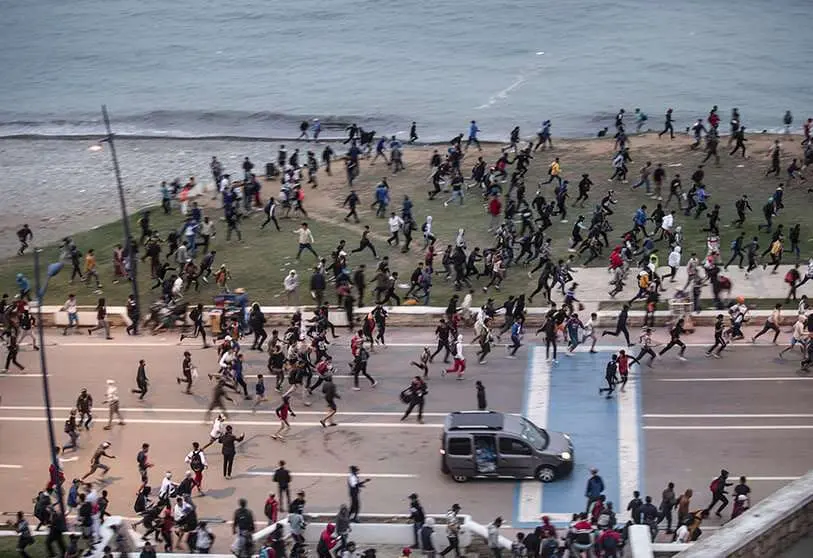Morocco's serious challenge

The southern neighbour has gone from being a privileged partner in all sectors, as Minister of Foreign Affairs, Arancha González Laya, has affirmed these days when addressing the crisis with Morocco created after taking in Polisario leader Brahim Ghali, considered a bitter enemy by the Rabat government, "for humanitarian reasons", to launching a challenge of enormous proportions. The arrival of more than 6,000 people in Ceuta, thanks to the relaxation of surveillance by Moroccan border agents and the spread among the people of the region of the possibility of going to Spain.
The population of Castillejos, the closest Moroccan village to Ceuta, has been living in very precarious conditions for more than a year after the closure of the border justified by the coronavirus pandemic and the disappearance of the porters' option that supported thousands of people. There is no work, no money, no hope of improving living conditions and, for this reason, reaching Spain and getting a better life is what drives thousands of Moroccans and sub-Saharan Africans to Ceuta. Most of them are unaware they are to be returned within a few hours by the Spanish authorities, with no objections from Moroccan customs officials. Another situation would be created if Morocco did not accept the return of these people, creating a very serious crisis situation in Ceuta.
In any case, Morocco's decision to challenge Spain and the European Union with a serious migration crisis, however reversible it may be on the ground, is extremely significant because it does not respect the borders of Spain and the European Union. The step taken by Rabat could be counterproductive since it places Spain and the European Union in the obligatory position of rejecting such pressure, especially given the magnitude of the situation on this occasion.
It is not the first time that Morocco has used the pressure of small boats and canoes towards the Canary Islands to negotiate with the European Union the support it needs to deal with the problems created by the pressure of sub-Saharan immigrants on its territory. But not to the current extent. On other occasions, the fishing agreement, Moroccan agricultural exports to the EU and other more or less usual frictions between neighbours were at stake.
Now, Morocco's risky gamble is due to its advocacy of a solution to the Sahara conflict with broad autonomy for the territory under Moroccan sovereignty. The solution offered by King Mohammed VI was endorsed on December 10 last by the Trump Administration, in the US presidency at the time, a decision that has been maintained by President Biden, and which has given a very considerable boost to Moroccan interests that has been followed by several countries opening consulates in the Sahrawi cities of El Aaiún and Dakhla, such as the Arab United Arab Emirates and Jordan, as well as several African countries.
The American representation will be opened in the coming months, and investments of more than 3 billion dollars are expected to be made in various sectors such as agriculture, fisheries, tourism, renewable energy and logistics. Tenders have been invited for the construction of a large port in the Dakhla area, awarded to a French company, which is interpreted as a favourable predisposition from France, because French President Emmanuel Macron's party, La République en Marche, has opened a headquarters in Dakhla itself. Beyond Morocco's displeasure with the Spanish government for welcoming the Polisario leader without giving the relevant explanations to Morocco and maintaining a public silence that put the Rabat government in a very bad light, the challenge launched in Ceuta aims to move the Spanish government and the European Union towards support for a Moroccan solution to the Sahara conflict, to put pressure on Algeria for a realistic and viable negotiation and to manage within the United Nations the process necessary to bring to a close a conflict that has lasted 45 years and which has kept thousands of Sahrawis living in subhuman conditions in the Tindouf camps.
Rabat's calculation, with its risky gamble in Ceuta, could get out of hand if it is maintained for too long and if it tightens a delicate rope too much because the territorial integrity and sovereignty of Spain and the European Union are at stake. It is true that the demonstration of mobilisation and of creating a serious conflict in Ceuta must be taken into account, but the public response can only be to firmly reject the attack and apply measures to prevent it. On other occasions, disputes between Spanish and Moroccan neighbours have required the personal intervention of the King and Queen of both countries. Everyone should be aware of the need for understanding, and the sooner the better.

